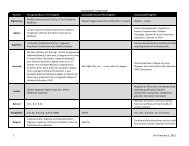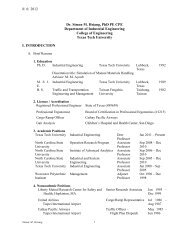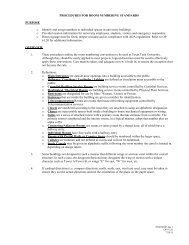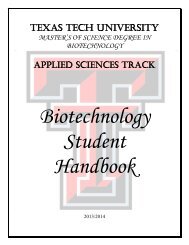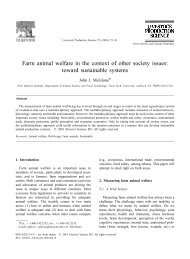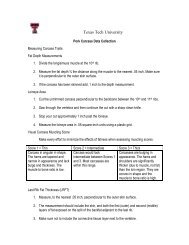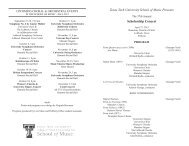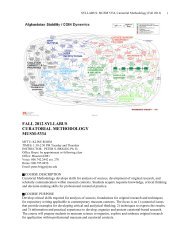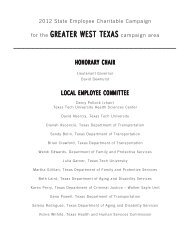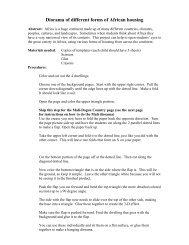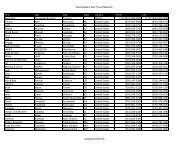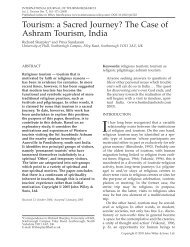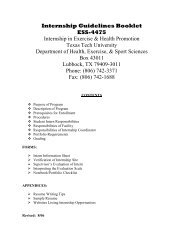Development of Tour Uriely 2005
Development of Tour Uriely 2005
Development of Tour Uriely 2005
You also want an ePaper? Increase the reach of your titles
YUMPU automatically turns print PDFs into web optimized ePapers that Google loves.
200 THE TOURIST EXPERIENCE<br />
this paper. Instead, the focus here is on identifying and evaluating<br />
major developments in the conceptualization <strong>of</strong> the experience. Specifically,<br />
by reviewing relevant literature across various topics, including<br />
the definition <strong>of</strong> the tourist role, typologies, authenticity, postmodern,<br />
and heritage tourism, four developments emerge: a reconsideration <strong>of</strong><br />
the distinctiveness <strong>of</strong> tourism from <strong>of</strong> everyday life experiences; a shift<br />
from homogenizing portrayals <strong>of</strong> the tourist as a general type to pluralizing<br />
depictions that capture the multiplicity <strong>of</strong> the experience; a<br />
shifted focus from the displayed objects provided by the industry to<br />
the subjective negotiation <strong>of</strong> meanings as a determinant <strong>of</strong> the experience;<br />
and a movement from contradictory and decisive academic discourse,<br />
which conceptualizes the experience in terms <strong>of</strong> absolute<br />
truths, toward relative and complementary interpretations.<br />
The current analysis suggests that these changes in conceptual<br />
trends involve a change in the style <strong>of</strong> academic theorizing. The conceptualizations<br />
derive from various theoretical frameworks, including<br />
phenomenology (Cohen 1979; <strong>Uriely</strong>, Yonai and Simchai 2002), a<br />
neo-Durkheimian perspective (MacCannell 1973), G<strong>of</strong>fmanian roletheory<br />
(Wickens 2002), conflict and cultural criticism (Barthes 1972;<br />
Boorstin 1964; Turner and Ash 1975), and a constructivist narrative-oriented<br />
approach (Elsrud 2004), but without attempting to endorse any<br />
<strong>of</strong> them. Instead, these are characterized and evaluated hereafter<br />
according to another theoretical construct, that <strong>of</strong> the distinction between<br />
‘‘modernist’’ and ‘‘postmodernist’’ forms or styles <strong>of</strong> academic<br />
knowledge (Bauman 1987, 1992; Denzin 1991; Flax 1990; Frazer<br />
1989; Hollinshead 2002; Ryan 2002; <strong>Uriely</strong> 1997). In line with this distinction,<br />
it is argued that while the early theories comply with the<br />
notion <strong>of</strong> modernist academic knowledge, contemporary conceptualizations<br />
<strong>of</strong> the same correspond to postmodernist modes <strong>of</strong> analysis.<br />
TOWARD POSTMODERNIST CONCEPTUALIZATIONS<br />
As a broad cultural phenomenon, postmodernity refers to a particular<br />
set <strong>of</strong> generalized developments that may constitute a new cultural paradigm<br />
and social consciousness (Lash and Urry 1987; Rojek 1995; Urry<br />
1990). However, postmodernity is also associated with diverse interrelated<br />
phenomena that developed after World War II in varied spheres<br />
<strong>of</strong> activity, such as art, architecture, sports, politics, cinema, tourism,<br />
and science (Denzin 1991). Accordingly, the term is utilized by scholars<br />
who grasp contemporary trends in tourism as manifestations <strong>of</strong> postmodernist<br />
rather than modernist culture (Baudrillard 1983; Eco 1986;<br />
Featherstone 1991; Fjellman 1992; Lash and Urry 1994; Munt 1994; Pretes<br />
1995; Rojek 1995; Urry 1990). Similarly, the notion <strong>of</strong> ‘‘postmodernist<br />
academic knowledge’’ or ‘‘postmodernist modes <strong>of</strong> theorizing’’ is<br />
utilized by those who perceive recent developments in the social sciences<br />
as reflection <strong>of</strong> postmodernity (Bauman 1987, 1992; Denzin 1991; Flax<br />
1990; Frazer 1989; Hollinshead 2002; Ryan 2002; <strong>Uriely</strong> 1997).<br />
Postmodernist forms and modes <strong>of</strong> theorizing are associated with a<br />
variety <strong>of</strong> characteristics, including deconstruction, subjectivity, skepti-



